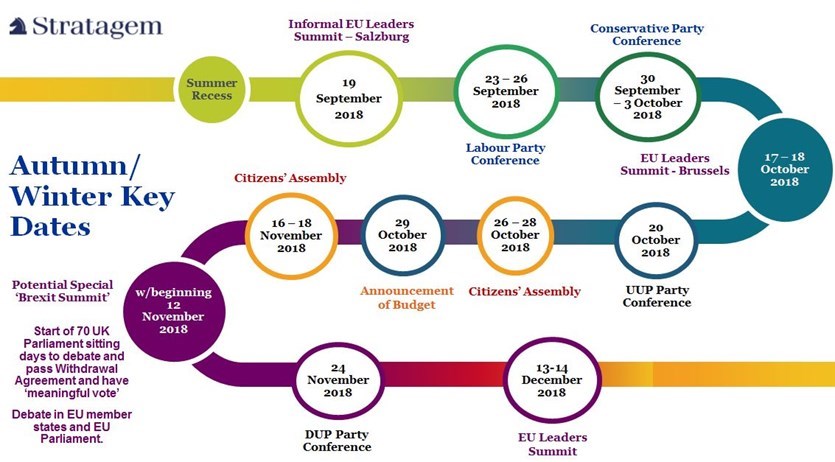The days are closing in… just like the UK’s time in the EU?
05 October 2018 - by Matthew JacksonWith the autumn party conference season in full swing, and Halloween just around the corner, the temperature of our politics remains heightened, though it sits well below boiling point.
Needless to say the UK’s exit from the EU will continue to occupy the minds of decision-makers, however it is by no means the only show in town, as indicated in our timeline below.
At the recent Labour and Conservative party conferences, leaders set out their visions of the UK’s post-Brexit landscape. Key figures traded blows with their political rivals while also taking aim at some within the party faithful.
The traditional Ulster fry fringe events in both Liverpool and Birmingham attracted a strong Northern Ireland contingent; the debate over ‘hard’ or ‘soft’ extending well beyond the choice of eggs.
The noises emanating from Birmingham relating to a possible UK version of the backstop solution to the quandary around Ireland’s internal border leave the next EU summit – scheduled for 18 October in Brussels – delicately poised, particularly after the EU rebuffed Prime Minister Theresa May’s Chequers plan in Salzburg last month.
Pending sufficient progress over the coming fortnight, EU leaders including President of the European Council Donald Tusk and the chief Brexit negotiator, Michel Barnier, have indicated that they would convene a special ‘Brexit Summit’ sometime during the week beginning 12 November.
The key points of divergence, as well as the landing zone of a potential deal, are, by this stage, well known. Will negotiators prioritise ideological, party, local, national or self interest? Or will realpolitik save the day?
Should a deal be reached at the this juncture, or at least seem within touching distance, the approximate 70 sitting days of the UK parliament between mid-November and the official exit date of 30 March 2019 leave little room for manoeuvre.
The London-based think tank, Institute for Government, points out that significant treaty changes have, in the past, taken about 40 days to get through parliament.
This will compete with existing parliamentary business, including debate on the Budget, set to be announced by Chancellor Philip Hammond on 29 October, and the passage of a Finance Bill.
The government also needs to win a ‘meaningful vote’ on the deal in the House of Commons before passing legislation giving the withdrawal agreement effect in UK law.
This process would run parallel to debate and ratification of the deal in each of the EU member states’ parliaments.
Sandwiched either side of the potential November UK-EU showdown are the UUP and DUP party conferences. The UUP is meeting on 20 October in the Armagh City Hotel, while the DUP will converge on Belfast’s Crowne Plaza on 24 November.
In spite of the political deadlock at Stormont, MLAs remain committed to delivering for local businesses and organisations. Expect Brexit, restoring the Assembly and the upcoming local council elections in May to dominate proceedings, coupled with a heavy dose of the blame game.
Northern Ireland’s inaugural Citizens’ Assembly will also meet during two weekends in October and November to discuss adult social care. Bringing together citizens who are broadly representative of the demographics of Northern Ireland and modelled on a similar system in the Republic of Ireland, it is hoped the Citizens’ Assembly will provide guidance on a number of key issues. It should introduce a fresh element of deliberative democracy to Northern Ireland.
With significant talks to restore the Assembly placed on the backburner until the spring, what implications will the Secretary of State’s comments on providing civil servants with greater powers have on local decision making?
Last month, Karen Bradley said she would introduce legislation that will include "provisions to give greater clarity and certainty to enable Northern Ireland departments to continue to take decisions in Northern Ireland in the public interest and to ensure the continued delivery of public services."
We wait to see if this legislation is restricted to easing the backlog of decisions waiting to be taken or whether it will enable civil servants to set policy direction in the absence of ministers.
So, amid the expected drama over the next few months, there remain ample opportunities to engage with and to influence political and policy discussions.
To find out we can ensure your message reaches the right audience, please feel free to get in touch with our Head of Consultancy, Gráinne Walsh.









